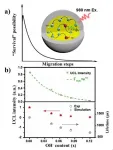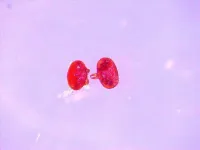(Press-News.org) Twenty scientists from 14 countries warn of a hidden "pandemic within the pandemic" in two current publications. On the one hand, physical activity levels have gone down significantly, on the other hand, psychological well-being has suffered. "Governments and those responsible for health systems should take our findings seriously," emphasizes the author team, headed by Dr Jan Wilke from the Institute for Sport Sciences at Goethe University Frankfurt.
About 15,000 people in participating countries answered standardised questionaires as part of an international survey. In April/May 2020, they reported physical activity levels (13,500 participants) as well as their mental and physical well-being (15,000 participants) before and during the pandemic-related restrictions.
Older individuals especially affected
"The results show drastic reductions in physical activity and well-being," says Wilke. More than two thirds of those questioned were unable to maintain their usual level of activity. Moderate exercise decreased by an average of 41 percent according to self-reported data - this includes anything that increases heart rate and breathing, such as brisk walking, running, cycling or even strenuous gardening.
The proportion of vigorous exercise during which people sweat and clearly run out of breath fell by a similar amount (42 percent). The effects were somewhat higher among professional athletes and particularly active people, as well as comparatively young and old people. The decline in activity was particularly noticeable among people over 70 years of age, who were 56 to 67 percent less active than before. "We know that physical inactivity, especially in older people, can lead to changes that are difficult to reverse after only two weeks - for example, in body fat percentage or insulin sensitivity," warn the study authors.
Exercise helps prevents disease and reduces mortality
The WHO recommends at least 150 minutes of moderate or 75 minutes of intensive physical activity per week - 81 percent of the study participants achieved this before the pandemic, but only 63 percent during the lockdowns. Yet sufficient exercise can reduce mortality by up to 39 per cent, as a 2015 study showed. Data suggests that too little exercise plays a role in about one in ten premature deaths, because physical activity reduces the likelihood of, for example, high blood pressure, metabolic disorders such as type 2 diabetes, and cancer.
Exercise is known to activate the immune system because it promotes blood circulation and activates lymphocytes and messenger substances (cytokines) that are important for immune defence. Studies show that physically active people are less susceptible to influenza, rhino and herpes viruses and respiratory infections in general. So it may be that exercise also offers protection against severe COVID-19 by reducing risk factors such as obesity. Physical health and exercise also reduce the risk of mental health problems such as depression and anxiety disorders.
Mental well-being drastically reduced
In another part of the study, the team of authors asked about mental well-being during the pandemic restrictions. 73 percent of the study participants stated that their well-being had deteriorated. The perceived quality of life as measured by the WHO well-being Index, which measures mood, relaxation, activity, rest and interest, dropped on average from 68 percent before the pandemic to 52 percent during the first lockdown phase.
Above all, people felt less "active and full of energy" and led a life less "filled with interesting things". The proportion of very low scores indicating a possible risk of depression tripled from 15 to 45 percent. "These effects were stronger among women and younger people, " the study says. "More attention should be paid to the needs of women in particular, as they are significantly more vulnerable."
Nonetheless, 14 to 20 percent of the respondents also stated that their health had improved - the authors see more family time, greater work autonomy, fewer business trips or a changed perception of health as possible reasons. "But a large part of the population may still be suffering from barely visible health effects of the pandemic," the team of authors warns.
This could also translate into rising health costs: According to US data, the annual expenditure for inactive or insufficiently active people increases by 1200 and 600 euros respectively - this would add up to two to four million euros after one year just for the 3104 people from the survey who did not exercise enough during the lockdown.
The results of these first multinational studies are likely to be relevant for an estimated four billion people worldwide who were affected by the restrictions of the first coronavirus wave in the spring of 2020. However, the data was predominantly collected through electronic media, so populations without internet were not included. Also, no differentiation was made according to factors such as living environment, education and social status. In addition, the data is based on self-assessments, not measurements, which may distort retrospective perceptions in particular. "Nevertheless, our results show that the issues of physical activity and well-being belong on the policy agenda," Wilke emphasises.
"Governmental and health-related decison-makers need to develop strategies to mitigate the loss of physical activity," write the authors. They suggest better public education, creating exercise opportunities with a low likelihood of infection, or offering effective home exercise programmes. Among numerous other health facets, this would have a particularly positive effect on mental well-being.
Negative effects similar to those observed in these studies should be avoided at all costs in future pandemics. "Unfortunately, physical activity and exercise do not have a strong lobby and are usually neglected in public discourse," says Wilke. "Yet they can greatly help us to better cope with the pandemic."
INFORMATION:
With global warming decreasing the size of New Zealand's alpine zone, a University of Otago study found out what this means for our altitude-loving kea.
The study, published in Molecular Ecology, analysed whole genome DNA data of the kea and, for the first time, its forest-adapted sister species, the kākā, to identify genomic differences which cause their habitat specialisations.
The researchers found the kea is not an alpine specialist, but rather one that adapted to using such an open habitat because it was least disturbed by human activity.
Co-author Associate Professor Michael Knapp, of the Department of Anatomy, says that is not likely to surprise people ...
Different from small molecules, polymer will fold into lamellar crystals during crystallization and further assemble into lamellar stacks.
Synchrotron Small-Angle X-Ray Scattering (SAXS) is an important tool to characterize such nanoscale structure and understand polymer crystallization. However, its scattering mechanism in semi-crystalline polymers is not completely elucidated yet.
Recently, a research group led by Prof. TIAN Xingyou from Institute of Solid State Physics, Hefei Institutes of Physical Science (HFIPS), proposed a complete set of new methods to characterize polymer lamellar crystals ...
Epithelial ovarian cancer (EOC) is the most common lethal gynaecological cancer. Ovarian cancer is usually treated with platinum-based chemotherapy; however, a significant number of patients are resistant to such treatments and relapse soon afterwards. To improve their survival, there is a need to first identify which patients may be platinum-resistant, so that newer treatments may be administered early.
Now, researchers from the Cancer Science Institute of Singapore (CSI Singapore) at the National University of Singapore (NUS), have discovered a way to predict which patients are resistant to platinum chemotherapy. The study, co-led by CSI Singapore Principal ...
Current best practices for encouraging more female students to pursue degrees in economics may actually have the opposite effect and worsen gender disparities in the field, a recent study from Oregon State University found.
The study examined whether mass emails telling introductory economic students about promising career and earning opportunities helped increase female participation in higher-level economics courses. But instead, these emails appealed more to male students, increasing male enrollment and widening the existing gender gap. There was no change in the probability of female students majoring in economics.
Researchers say this demonstrates a need for more personalized, deliberate interventions.
"There ...
Using renewable energy to replace fossil energy is now considered the best solution for greenhouse gas emission and air pollution problems. As a result, the demand for new and better energy storage technology is strong.
As part of the effort to improve this technology, a group led by Prof. ZHANG Suojiang from the Institute of Process Engineering (IPE) of the Chinese Academy of Sciences (CAS) recently found that ionophobic electrodes can boost energy storage performance.
Their study was published in the Journal of Materials Chemistry A on May 8.
Electric Double-Layer Capacitors (EDLCs) with ionic liquids (ILs)--as a new type of energy storage device--can fill the gap between the power density of batteries and the ...
Human-driven global change is challenging the scientific community to understand how marine species might adapt to predicted environmental conditions in the near-future (e.g. hypoxia, ocean warming, and ocean acidification). The effects of the uptake of anthropogenic atmospheric CO2 by oceans affects (i.e. ocean acidification) propagate across the biological hierarchy, from changes in the building blocks of life at nano-scales to organism, physiology and behaviour through ecosystem processes and their properties.
To survive in a reduced pH environment, marine organisms have to adjust their physiology which, at the molecular level, is achieved by modifying the expression ...
The great application prospect in biology, medicine, optogenetics, photovoltaics and sustainability has enabled lanthanide ions-doped upconversion nanoparticles to attract widespread attention which derives mainly from their superior anti-Stokes spectroscopic property. However, the relatively low upconversion efficiency remains a major bottleneck on their way of actual applications. Internal OH- impurity is known as one of the main detrimental factors affecting the upconversion efficiency of nanomaterials. Different from surface/ligand related emission quenching which can be effectively diminished by, e.g., core/shell structure, internal OH- is easy to be introduced during synthesis but difficult to be quantified and controlled.
In a new paper published in Light Science ...
PHILADELPHIA--Antibodies aren't the only immune cells needed to fight off COVID-19 -- T cells are equally important and can step up to do the job when antibodies are depleted, suggests a new Penn Medicine study of blood cancer patients with COVID-19 published in Nature Medicine. The researchers found that blood cancer patients with COVID-19 who had higher CD8 T cells, many of whom had depleted antibodies from cancer treatments, were more than three times likelier to survive than patients with lower levels of CD8 T cells.
"It's clear T cells are critical in terms of the early infection and to help control the virus, but we also showed that they can compensate for B cell and antibody responses, which blood cancer patients are likely missing because of the drugs," said co-senior author Alexander ...
PULLMAN, Wash. -- A new fungus strain could provide a chemical-free method for eradicating mites that kill honey bees, according to a study published this month in Scientific Reports.
A team led by Washington State University entomologists bred a strain of Metarhizium, a common fungus found in soils around the world, to work as a control agent against varroa mites. Unlike other strains of Metarhizium, the one created by the WSU research team can survive in the warm environments common in honey bee hives, which typically have a temperature of around 35 Celsius (or 95 F).
"We've known that metarhizium could kill mites, but it was expensive and didn't last long because the fungi died in the hive heat," said Steve Sheppard, professor in WSU's Department of Entomology and corresponding ...
A research group at the University of Córdoba evaluated the commercial mixture formulated in a laboratory and the tank-based mixture of two herbicides to determine which method is more effective in terms of weed control and environmental impact.
In 2017 the company Nufarm Europe proposed to the Higher Technical School of Agricultural and Forestry Engineering (ETSIAM) at the UCO a study of the results of two products having a significant agronomic impact: the herbicides glyphosate and 2,4-D (synthetic auxin). After three years of research, they concluded that the commercial mix produced in the company's laboratories is more effective than manual mixes produced in tanks.
To do this, they used in vivo techniques (tests with greenhouse ...






